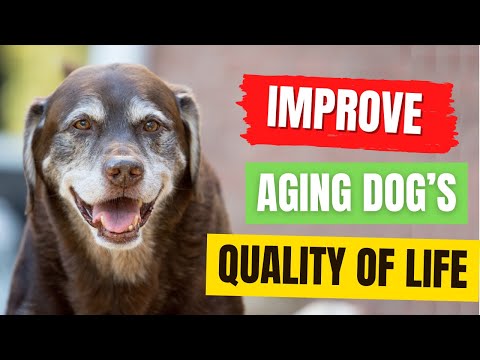As beloved companions, Golden Retrievers hold a special place in many hearts. Understanding the aging process in these gentle giants is essential for any owner as it not only impacts the dog’s quality of life but also strengthens the bond between pet and owner. With an average lifespan of 10 to 12 years, Golden Retrievers experience significant changes in their physical and emotional health as they enter their senior years. Recognizing the signs of aging and adapting care practices accordingly can help ensure that these loyal friends enjoy their twilight years in comfort and happiness.
Understanding Aging in Golden Retrievers

Lifespan Expectations
Golden Retrievers typically live between 10 to 12 years, but various factors influence their longevity, including genetics, diet, and overall care. While some may surpass these averages, others may succumb to health issues earlier. For instance, responsible breeding practices, regular veterinary care, and a balanced diet rich in essential nutrients can significantly impact a dog’s lifespan. Moreover, maintaining a healthy weight and providing mental stimulation can help mitigate the risks of common age-related ailments.
Developmental Stages
Golden Retrievers progress through several key developmental stages: puppyhood, adolescence, adulthood, and senior years. Each phase is marked by distinct characteristics. During puppyhood, they are playful and energetic, while adolescence brings challenges in training and behavior. As they enter adulthood, they become more stable, showcasing their intelligence and loyalty. However, by the time they approach their senior years, owners may notice a shift in energy, health, and temperament, warranting a deeper understanding of their needs for appropriate care.
Aging Process Overview
The aging process encompasses a variety of physiological changes. A senior Golden Retriever may experience a slower metabolism, leading to weight gain or difficulty maintaining a healthy weight. Joint health often declines due to conditions like arthritis or hip dysplasia, which are prevalent in the breed. Additionally, cognitive function may diminish, impacting memory and learning capabilities. Recognizing these changes early on is crucial for developing a tailored care plan that can enhance the dog’s quality of life.
Physical Changes in Senior Golden Retrievers

Common Health Issues
As Golden Retrievers age, they become susceptible to several common health issues. Conditions such as hip dysplasia occur in approximately 20% of the breed, while arthritis affects around 60% of senior dogs. Additionally, heart disease is a growing concern, with varying statistics indicating prevalence rates between 10-20%. Regular veterinary check-ups become essential for early detection and management of these health issues. Owners should remain vigilant for signs of pain or discomfort, which could indicate underlying health concerns.
Changes in Appearance
Physical characteristics also evolve as Golden Retrievers age. Owners may notice a gradual graying of fur, particularly around the muzzle and eyes. Changes in weight, whether gain or loss, can also occur, often indicating a need for dietary adjustments. Muscle mass typically decreases, resulting in a leaner appearance. These changes, while normal, require owners to adapt their care routines for optimal health, ensuring that their aging companions receive the right nutrition and exercise.

Nutritional Needs
Nutritional requirements shift significantly as dogs transition into their senior years. Senior dog formulas, which are lower in calories and richer in fiber, can help manage weight and promote digestive health. Supplements such as glucosamine and omega fatty acids are recommended to support joint health and reduce inflammation. Consulting with a veterinarian can provide tailored dietary recommendations that cater to an individual dog’s needs, enhancing their overall wellbeing.
Behavioral Changes in Aging Golden Retrievers
Cognitive Dysfunction Syndrome (CDS)
Cognitive Dysfunction Syndrome (CDS) is a condition that affects many senior Golden Retrievers. Similar to dementia in humans, CDS can lead to confusion, disorientation, and changes in sleep patterns. Symptoms may include increased anxiety, loss of house training, and decreased interaction with the family. Veterinary resources suggest that CDS affects an estimated 14-35% of senior dogs, emphasizing the importance of recognizing its signs and seeking appropriate treatment options to enhance mental function.
Changes in Activity Levels
As Golden Retrievers age, their energy levels typically decline. Owners may find that their once-active companions prefer more leisurely strolls over vigorous runs. This change necessitates adjustments to daily routines, ensuring that dogs receive adequate exercise without overexertion. Gentle activities like swimming or short walks can help maintain their fitness while minimizing stress on their joints. Mental stimulation through puzzle toys or basic training can also be beneficial in keeping their minds sharp.
Behavioral Issues
In addition to cognitive changes, behavioral issues may arise. Increased anxiety, particularly during transitions or changes in routine, can be common in senior dogs. Social interactions may also shift; some Goldens may become less tolerant of younger, more energetic dogs or even family members. Providing a stable environment, maintaining routines, and offering comfort through gentle reinforcement can help manage these changes, improving the dog’s emotional wellbeing.
Caring for Senior Golden Retrievers
Health Monitoring
Regular veterinary check-ups are paramount for senior Golden Retrievers. These visits allow for early detection of age-related health issues, enabling proactive treatment. Routine screenings for common conditions, including blood work and joint evaluations, can help identify potential problems before they escalate. Owners should be attentive to any changes in behavior or health and communicate these observations to their veterinarian to ensure comprehensive care.
Tailored Exercise Routines
Exercise routines for senior Golden Retrievers should be carefully tailored to accommodate their physical capabilities. Low-impact activities, such as short leash walks and gentle play sessions, can help maintain their health without straining their joints. Incorporating mental stimulation, such as interactive toys or scent games, can also enrich their daily routine. Consistent, moderate exercise not only supports physical fitness but also enhances mental health and emotional stability.
Home Environment Adjustments
Making adjustments to the home environment can significantly enhance the comfort of senior Golden Retrievers. Non-slip rugs can help prevent falls on slick floors, while accessible resting areas, such as orthopedic beds, can support their aging joints. Additionally, establishing a quiet space free from excessive noise can provide a safe haven for dogs that may experience anxiety or disorientation. Simple modifications can create a more accommodating environment, allowing aging Goldens to thrive.
Emotional and Social Considerations
Bonding with Aging Goldens
Maintaining a strong emotional connection with aging Golden Retrievers is crucial for their happiness and wellbeing. Spending quality time through gentle play, grooming, or simply cuddling can strengthen the bond between pet and owner. As dogs age, they may become more sensitive to changes in their environment or routine, making consistent companionship all the more important. Engaging with them in activities they enjoy fosters a sense of security and comfort during their senior years.
End-of-Life Considerations
Addressing end-of-life care for a senior Golden Retriever is a sensitive yet essential topic. As dogs age, owners must consider their quality of life through regular assessments. Discussing palliative care options with a veterinarian can provide insights into managing pain and enhancing comfort. Decisions around euthanasia, if necessary, should be made with compassion and consideration for the dog’s overall wellbeing, ensuring they experience dignity in their final moments.
Support for Owners
Caring for a senior Golden Retriever can be emotionally challenging. Many owners benefit from support networks, such as community groups dedicated to pet care or local veterinarian resources. Online forums and social media platforms can provide a sense of community, allowing owners to share experiences and seek advice. Additionally, consulting with veterinarians about behavioral and health concerns can equip owners with the necessary tools for navigating the unique challenges of caring for senior dogs.
Conclusion
Aging Golden Retrievers present unique traits and challenges that require understanding and compassion. From health vulnerabilities and physical changes to behavioral shifts and emotional needs, recognizing these aspects is crucial for providing the best care possible. Cherishing each moment with your senior Golden, while advocating for their health and happiness, ensures that their golden years are filled with love and comfort. As they age gracefully, they remind us of the joys of companionship and the importance of being attentive caretakers.





